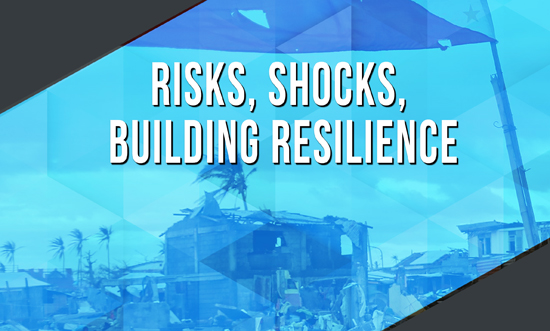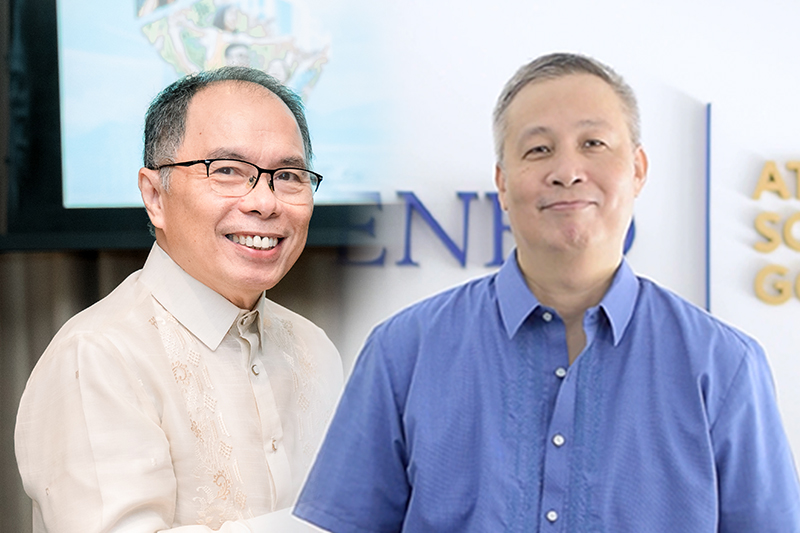
The Philippine Institute for Development Studies (PIDS) focuses its new five-year research agenda for the period 2015-2020 on risks, shocks, and building resilient systems. Ranked in the top 15 most vulnerable countries in the world, the Philippines faces a host of environmental, economic, and sociopolitical risks. Through research, PIDS intends to help build resilient systems. Understanding risks, where they come from, and how they are connected, is essential to create the right kind of policies that will enable the country and its highly vulnerable communities acquire absorptive, adaptive, and transformative capacities.
PIDS aligns its new Economic Policy Monitor with the agenda’s theme. Chapter 3, penned by PIDS President Gilberto Llanto, details the different kinds of risks faced by the Philippines and the policy framework for building multiple resilient systems. Currently, the narrative of building resilience is confined to disaster risk reduction and management. In truth, risks are varied and their sources are numerous. There is a gap in understanding and a gap in policy-oriented research into the deeply interconnected and evolving nature of risks. A system is necessary not only to withstand risks to growth and stability, but also to ensure that the most vulnerable are protected. The poor and the marginalized are the ones most threatened by economic instability, environmental disasters, and political crises. And because these risks are not static, but are interconnected and constantly evolving, the kind of resilient system needed must be absorptive, adaptive, and transformative. A comprehensive understanding of the risk landscapes is critical. Just as well, policy conversations have to shift from targeting the reduction of vulnerability to building resilient systems. The chapter discusses the breadth of research in resiliency at every level of Philippine society—household, community, national, political, economic, and regional levels. But further research is recommended to strengthen the policy framework.
Meanwhile, examples of good policies undertaken in 2015 and the remaining policy gaps are discussed in Chapter 2 by PIDS senior research fellows. Proper and consistent implementation, good monitoring, and regular evaluation are key ingredients to make these policies work. But beyond this, good policies should aim for sustainability and inclusiveness; the strategy should be to increase growth and to ensure that people in the most vulnerable sectors have access to the opportunities generated by this growth. Policies that have targeted this objective include the Microfinance NGOs Act, the Youth Entrepreneurship Act, the Open High School System Act, and the Children’s Safety on Motorcycles Act of 2015. The outgoing administration also sought to address the financial needs of the agriculture sector amid rising volatility brought by climate change, and protect the well-being of persons with disabilities by requiring their mandatory enrollment in the National Health Insurance Program. For the succeeding administration, more concerted efforts are needed to address issues in urban planning and housing, agricultural resilience, environmental management, infrastructure, access to information and communication technology, market competition, and trade in services, among others.
Chapter 1 enumerates the global threats and risks faced by the country: the growth slowdown in the region, the trickle-down effect of the drop in oil prices on Philippine export labor, and the impact of climate-related issues such as El Niño on the country’s agriculture. The ability to absorb these shocks and adapt to their effects requires good policies informed by research and policy dialogue. The Philippines’ economic performance in the past six years—growing at an average rate of 6.2 percent from 2010 to 2014—was enabled primarily by good governance and good policies such as “improved rate of capital formation, a sound fiscal balance, and a favorable pattern of structural transformation”. The same level of efficacy must be sustained in the next administration to further bolster the country’s economic resilience and to achieve the much-coveted goal of sustainable and inclusive development.
Know what other PIDS studies have to say about building resilience. Visit the SocioEconomic Research Portal for the Philippines. Simply type “resilience”, "risk reduction", “risk management”, “vulnerability", and related terms in the Search box.
- Economic Policy Monitor 2015-2016: Risks, Shocks, Building Resilience: Philippines
- Risks, Shocks, Building Resilience: Philippines
- Building Philippine SMEs Resilience to Natural Disasters
- Community Governance for Disaster Recovery and Resilience: Four Case Studies in the Philippines
- Quick Response Funds and DRRM Resources in the Department of National Defense and Various Departments
- Mainstreaming Disaster Risk Management in Local Governments
- El Nino Southern Oscillation in the Philippines: Impacts, Forecasts, and Risk Management
- The Impact of the Global Financial Crisis on Poverty in the Philippines
- Deepening Regional Cooperation for Disaster Approach to Risk Financing
- Disasters, Poverty, and Coping Strategies: The Framework and Empirical Evidence from Micro/Household Data – Philippine Case
- Forecasting Natural Hazards and Disasters in Selected Southeast Asian Countries: The Need for Cooperative Action
- Innovations in Financing Food Security
- Estimation of Vulnerability to Poverty Using a Multilevel Longitudinal Model: Evidence from the Philippines
- Monitoring Economic Vulnerability and Performance: Applications to the Philippines
- Financial Liberalization: Managing Risks and Opportunities












